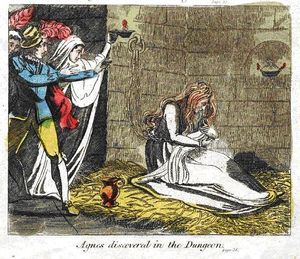Annotation:Raymond and Agnes: Difference between revisions
(Created page with "=='''Back to [[{{BASEPAGENAME}}]]'''== ---- <p><font face="garamond, serif" size="4"> '''RAYMOND AND AGNES.''' AKA and see "Always Pretty," "None so Pretty (3)." Engli...") |
m (Text replacement - "garamond, serif" to "sans-serif") |
||
| (4 intermediate revisions by 2 users not shown) | |||
| Line 1: | Line 1: | ||
=='''Back to [[{{BASEPAGENAME}}]]'''== | =='''Back to [[{{BASEPAGENAME}}]]'''== | ||
---- | ---- | ||
<p><font face=" | <p><font face="sans-serif" size="4"> | ||
'''RAYMOND AND AGNES.''' AKA and see "[[Always Pretty]]," "[[None so Pretty (3)]]." English, Reel (cut time). D Major. Standard tuning (fiddle). AABB. The reel appears as "None so Pretty (3)" in a few | '''RAYMOND AND AGNES.''' AKA and see "[[Always Pretty]]," "[[None so Pretty (3)]]." English, Reel (cut time). D Major. Standard tuning (fiddle). AABB. The reel appears as "None so Pretty (3)" in a few country dance publications of the late 1790's and early 1800's, and as "Always Pretty" in Glasgow publisher James Aird's fifth volume of his '''Selections''' (1801). The title "Raymond and Agnes," from Preston's country dance collection of 1798 may have been acquired through association with Charles Farley's 'Grand ballet pantomime of action' '''Raymond and Agnes; or, the Castle of Lindenbergh''', staged at the Theatre-Royal, Covent Gardern, in 1797 (music by William Reeve, 1757–1815). It featured the Gothic spectre the "Bleeding Nun," the ghost of Agnes's murdered mother, the former Countess Lindenbergh. | ||
<br> | <br> | ||
<br> | <br> | ||
</font></p> | </font></p> | ||
<p><font face=" | [[File:agnes.jpg|300px|thumb|right|]] | ||
<p><font face="sans-serif" size="4"> | |||
''Source for notated version'': | ''Source for notated version'': | ||
<br> | <br> | ||
<br> | <br> | ||
</font></p> | </font></p> | ||
<p><font face=" | <p><font face="sans-serif" size="4"> | ||
''Printed sources'': '''Preston's | ''Printed sources'': '''Preston's Twenty Four Country Dances for the Year 1798'''. | ||
<br> | <br> | ||
<br> | <br> | ||
</font></p> | </font></p> | ||
<p><font face=" | <p><font face="sans-serif" size="4"> | ||
''Recorded sources'': <font color=teal></font> | ''Recorded sources'': <font color=teal></font> | ||
</font></p> | </font></p> | ||
<br> | <br> | ||
<br> | <br style="clear:both"/> | ||
---- | ---- | ||
=='''Back to [[{{BASEPAGENAME}}]]'''== | =='''Back to [[{{BASEPAGENAME}}]]'''== | ||
Latest revision as of 14:37, 6 May 2019
Back to Raymond and Agnes
RAYMOND AND AGNES. AKA and see "Always Pretty," "None so Pretty (3)." English, Reel (cut time). D Major. Standard tuning (fiddle). AABB. The reel appears as "None so Pretty (3)" in a few country dance publications of the late 1790's and early 1800's, and as "Always Pretty" in Glasgow publisher James Aird's fifth volume of his Selections (1801). The title "Raymond and Agnes," from Preston's country dance collection of 1798 may have been acquired through association with Charles Farley's 'Grand ballet pantomime of action' Raymond and Agnes; or, the Castle of Lindenbergh, staged at the Theatre-Royal, Covent Gardern, in 1797 (music by William Reeve, 1757–1815). It featured the Gothic spectre the "Bleeding Nun," the ghost of Agnes's murdered mother, the former Countess Lindenbergh.

Source for notated version:
Printed sources: Preston's Twenty Four Country Dances for the Year 1798.
Recorded sources:
